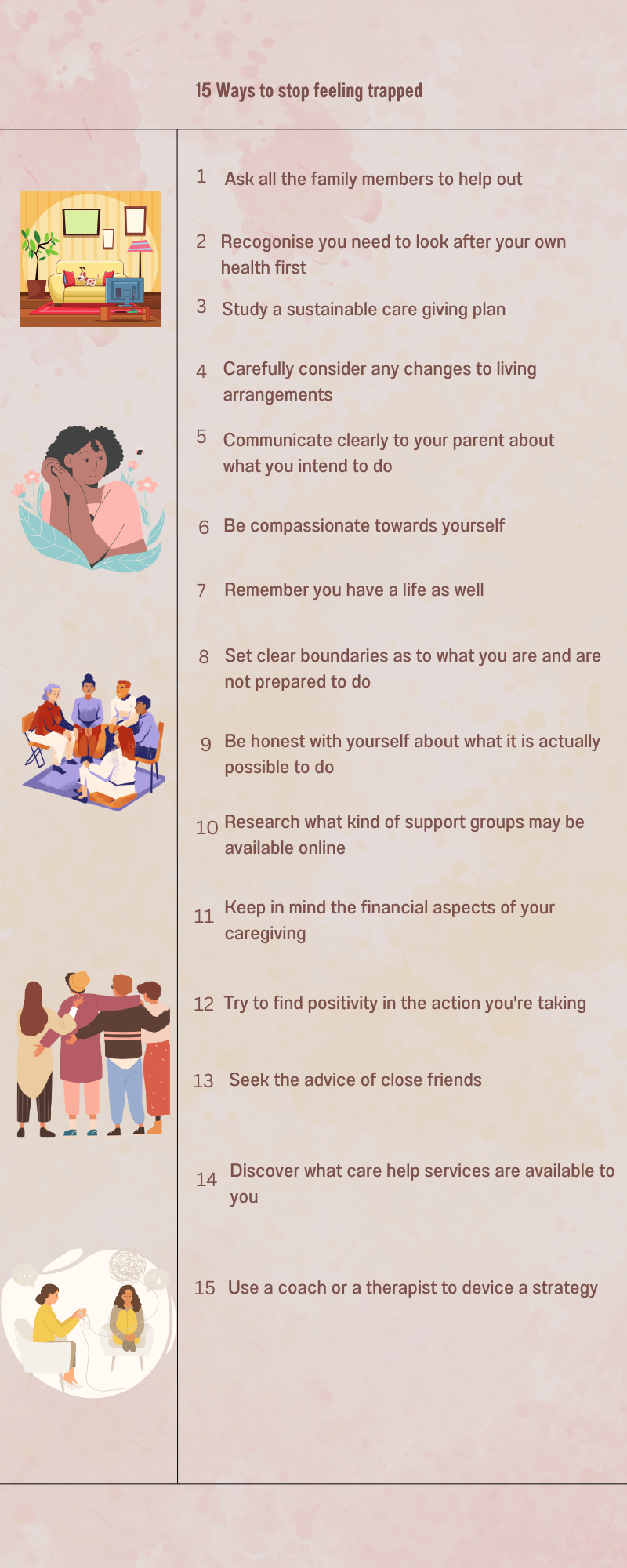How To Stop Feeling Trapped Caring For An Elderly Parent
Why is taking care of elderly parents so stressful?
Many people will find themselves in the stressful situation of looking after elderly parents.
Taking care of elderly parents can be incredibly stressful due to a combination of emotional, physical, and financial challenges.
The emotional weight can stem from the deep love and concern for your parent’s well-being, coupled with the fear of losing them or witnessing their decline.
Physically, looking after elderly parents often requires significant time and energy, impacting personal responsibilities and daily routines.
Additionally, navigating medical decisions, managing medications, and coordinating healthcare services can be overwhelming, especially if you are not familiar with the complexities of elderly care.
Financially, the burden of expenses related to healthcare and potential long-term care solutions can strain resources, leading to anxiety and uncertainty about the future.
This mix of responsibilities and emotions can create a high level of stress, making it essential to seek support and develop coping strategies.
Is it normal to resent caring for elderly parents?
Feeling resentful toward caring for elderly parents is nothing to feel guilty about; these feelings are entirely normal.
The demands can be overwhelming and can lead to physical and emotional exhaustion.
Caring for another person can leave you balancing your personal life, work, responsibilities and the needs of your parents. This can contribute to a sense of conflict and frustration.
You do need to acknowledge your feelings, you have so much to cope with. Understanding that these feelings are common, can help you to feel less alone, and more able to seek the support of others and resources out there to maintain your own well-being while providing the needed care for your parent.
15 Ways to Stop Feeling Trapped
1. Ask all the family members to help out
When you are in the situation of caring for elderly parents, the responsibility can be overwhelming and can lead to a sense of being trapped. To counteract these thoughts and feelings, it is important to involve other family members to aid in caregiving.
Take time to have open discussions about the level of responsibility you have and what they need to do to help. Establish a more equal distribution of tasks, this will help you to feel more supported and less alone.
Other family members need to contribute their time and skills along with you, to help lighten the load and strengthen the family bonds when you are all working together.
2. Recognise you need to look after your own health first
Caring for an elderly parent can often lead to you feeling overwhelmed and trapped, especially if your personal health needs are neglected.
To break free from this cycle, it's essential to recognize that prioritizing your well-being is not selfish; it's a necessary step.
Make sure you factor in time for yourself to rest, recharge and reconnect with yourself.
When you are feeling well rested you will be able to give more to those who need your help and assistance.
3. Study a sustainable caregiving plan
Creating a sustainable caregiving plan is essential to avoid feeling trapped while caring for an elderly parent.
Begin by assessing their needs and your limits, ensuring that you establish clear boundaries. Involve your parent in the planning process to promote their independence and maintain their dignity.
Prioritize regular breaks for yourself, whether through social support, respite care, or scheduled time away to recharge. Embrace community resources, such as adult day programmes or local support groups, that can lighten your responsibilities and connect you with others in similar situations.
By implementing a structured plan, you can cultivate a more balanced caregiving experience that nurtures both your well-being and your parent’s quality of life.
4. Carefully consider any changes to living arrangements
Carefully considering changes to living arrangements can significantly alleviate the feelings of being trapped while caring for elderly parents.
Spend time evaluating alternative housing options that maintain their comfort and safety, such as downsizing to a more manageable space or exploring assisted living facilities that provide necessary support.
Open discussions with your parents about their preferences and needs can empower everyone involved and foster a sense of control over the situation.
Additionally, assessing the logistics of caregiving, including location, accessibility, and available community resources, can help create a healthier balance between tending to their needs and preserving your well-being. Making thoughtful adjustments can create a more fulfilling dynamic for you and your parents.
5. Communicate clearly with your parent about what you intend to do
Open communication is essential with your parent, about how you're feeling and your intentions moving forward. Start by expressing your love and appreciation for them, which sets a positive tone for the conversation, you don’t want them to feel they are a burden to you.
Clearly articulate the feelings of being trapped that you might be experiencing, explaining how it's affecting your well-being. Share your intentions to seek support, whether that means exploring respite care, involving other family members, or accessing community resources that can assist with caregiving responsibilities.
By approaching the discussion with honesty and a plan, you can help your parent understand that seeking balance doesn't diminish your care; rather, it ensures that both of you can thrive.
6. Be compassionate towards yourself
Be compassionate towards yourself to alleviate the feelings of being trapped while caring for an elderly parent. Caregiving can be emotionally and physically demanding, you need to recognize this.
Allowing yourself to feel a mix of emotions, will help you to move through this time. Don’t carry guilt or frustration with you, when you are feeling trapped, acknowledge your feelings as valid and reasonable.
Self-compassion will allow you to set healthy boundaries and reduce the sense of overwhelm.
When you prioritise your well-being, you can approach caregiving with a refreshed mindset, fostering a more balanced relationship that takes the needs of you and your parent into consideration.
7. Remember you have a life as well
As harsh as it might sound when you say to yourself, you have to remember you have a life as well and it could include children, a partner, extended family as well as work commitments, your own house to run and many other responsibilities.
You can’t just abandon everything else, you need to come to a compromise and make adjustments to fit everything in. Your life is just as important, no matter how much guilt you may feel.
8. Set clear boundaries as to what you are and are not prepared to do
Setting clear boundaries is essential for maintaining your well-being while caring for an elderly parent. Look at what care needs your parent has and identify specific tasks and responsibilities you can and are willing to take on.
You need to establish time for you to concentrate on your life and your well-being. If you have other family members who can help, delegate to them. You need to recognise what you can do to take care of your well-being and to ensure you continue to have a happy and harmonious relationship with your parent.
9. Be honest with yourself about what it is actually possible to do
Caring for an elderly parent can be emotionally and physically draining. They may have medical care needs, financial needs or physical and emotional needs you aren’t trained or able to cope with.
You need to be honest with yourself about what you can do. There is no point in agreeing to do something you know you won’t be able to commit to, this will produce more stress and anxiety.
Have an honest and open discussion and agree on actions you know you will be able to commit to keep everyone happy.
10. Research what kind of support groups may be available online
There are many different support groups available for caregivers so do some online research and see what you may be entitled to. Parents in different financial levels can sometines get help from a government source. It could be a respite, a support group or financial aid.
Do your research and see what is available to you. Don’t try and do everything on your own. There can often be support groups for people who are caregivers, which can be helpful during difficult times.
Often the support and counsel of other people in the same situation can help you through the tougher times.
11. Keep in mind the financial aspects of your caregiving
Fiscal matters can be stressful at the best of times but it can be especially overwhelming when caring for an elderly parent. You need to make sure you go into the role fully understanding the financial aspects of the situation.
It’s essential to assess and understand the true costs associated with caregiving. There are many things to take into consideration such as medical expenses, home modifications, and potential loss of income due to decreased work hours or job changes.
You will need to create a budget that outlines in detail the costs to allow you to make informed decisions. Goverment or community resources can help to alleviate some of the financial burden if you are eligible.
12. Try to find positivity in the action you're taking
There’s no doubt caring for an elderly parent can be a stressful and emotional time.
There can also be positives to the situation. See it as a time to bring you closer together. There are often certain periods in life where the relationship between parent and child can begin to fall away.
See the time you spend as a caregiver as an opportunity to bring you closer together in their last years.
This can be such a wonderful time to discover more about them and their life, their hopes and dreams. This can be a wonderful time to start creating deeper bonds between you both.
13. Seek the advice of close friends
If you have close friends who are going through the same experiences as you, seek them out so you can discuss the situation together. When people are having similar experiences they can be of great support, offering advice, an ear to listen to and often practical advice.
Having other people around you will help you to get through this time. It can be difficult going through this situation alone. Having the emotional and physical support of other people can be a real lifeline for you.
14. Discover what care help services are available to you
Discovering available care help services can significantly help you to cope with the burden of caring for an elderly parent. There could be many options available to you such as in-home care agencies, adult day care programmes, and respite care.
Seeking out these services can help you with day-to-day activities, and medical needs. They can offer companionship, allowing you to take breaks and focus on your well-being.
15. Use a coach or a therapist to devise a strategy
Don’t go through this time alone. Many trained people in the community can help you deal with caring for an elderly parent to prevent you from feeling trapped.
Seek out the support and advice of a coach or a therapist who can help you devise a strategy.
They will be able to look at your situation more objectively and will be able to help you put together real solutions and plans to get you through this period in your life.
They will be able to show you the importance of self-care and help with your emotional needs meaning you are able to look after yourself and your life without feeling guilty or overwhelmed.
Final Thoughts
Feeling trapped while caring for an elderly parent is a shared experience that many people face, but there are effective strategies to regain a sense of control and fulfilment.
You need to begin by establishing clear boundaries that prioritize your well-being alongside looking after your parent.
Make sure you seek support from family, friends, or professional services to share the caregiving load or to provide respite.
Factor in self-care time and commit to regular activities that bring you joy and recharge your batteries whilst reminding you of your own life outside of caregiving.
Make open communication with your parent a priority.
You need to be able to express your feelings and encourage them to maintain their independence where possible.
Ultimately, acknowledging your needs and seeking resources from family members, friends and the wider community can transform the experience from one of feeling trapped to a more balanced relationship that strengthens the relationship you have with your parent.
At the end of the day, everyone wants what is best for the parent concerned so working together and devising a plan should be the the most important point.
Each person needs to feel they are being treated with respect and understanding.
If you would like to listen to the audio version of this blog post click below;
If you have enjoyed this blog post please comment and share below












